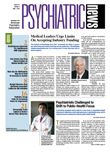About half of people suffering from schizophrenia since their youth experience improvement in symptoms and functioning as they get older, but the vast majority of older patients still face many difficulties in living a satisfying life integrated into the community.
At a presentation at the American Association for Geriatric Psychiatry annual meeting in Honolulu in March, Carl Cohen, M.D., a professor and director of the Division of Geriatric Psychiatry at the State University of New York (SUNY) Downstate Medical Center in Brooklyn, described five models of evaluating clinical and psychosocial outcomes in older patients living with schizophrenia that encompass (1) remission, (2) recovery, (3) community integration, (4) objective successful aging, and (5) subjective successful aging. Cohen noted that each individual model used was previously developed and reported on by different researchers not involved in this study.
Based on published studies and research conducted in the New York City area by Cohen and his SUNY colleagues, “about 50 percent of people with schizophrenia reach older age ... and their symptoms generally improve from younger age,” Cohen noted. Most patients are diagnosed in their teens and early 20s, he told Psychiatric News. Their health and social status in older age tend to be somewhere between younger schizophrenia patients and older adults in the general population without schizophrenia. About 15 percent to 20 percent of older patients remain severely ill and more or less institutionalized or get worse with age. The other 30 percent or so patients remain in the social functioning level similar to their younger years.
As patients age, positive symptoms and negative symptoms tend to improve. About half of the patients tend to have mild or no symptoms. Depressive symptoms, which are common in schizophrenia, may stay the same or worsen: about one-third of patients may have syndromal depression and one-third subsyndromal depression, Cohen said. Adaptive functioning may improve in many patients. Overall, however, only about one-tenth of these patients reach full recovery with no symptoms or impairments.
Using the five models of outcomes, Cohen and colleagues assessed the clinical and social indicators in two groups of adults 55 years or older who were living in the community in New York City. The two groups consisted of 198 people with schizophrenia and 113 without schizophrenia who were matched in age, gender, and income.
In terms of remission, half (49 percent) of the schizophrenia patients met the clinical criteria, defined as a score of 3 or less on eight domains of the Positive and Negative Syndrome Scale (PANSS) and no hospitalization in the previous year. “So symptom remission is a realistic goal for many of our older patients in the community,” Cohen said.
The researchers defined recovery, the focus of the second outcome model, as clinical remission and social functionality, including the ability to manage medications and money independently, having at least one confidant, and joining activities with others. According to these criteria, 17 percent of the schizophrenia group had achieved recovery.
In the third outcome model, four areas of community integration are assessed: the patient's independence, psychological integration, physical integration, and social integration with the surrounding community. Based on 12 criteria of community integration in the four areas, the nonschizophrenic community group scored an average of 8.85, compared with 7.55 for their peers with schizophrenia. The difference was statistically significant.
Cohen and colleagues used a six-item scale for “successful aging” based on a model proposed by Rowe and Kahn, which evaluates a person's physical health, cognitive and physical functions, and engagement with life; the last aspect was defined as having three or more confidants and three or more instrumental linkages and/or working and/or does heavy and light housework. The community group scored 4.35 on a scale of 0 to 6, and the schizophrenia group scored 3.04; the difference was statistically significant.
The last outcome model, subjective successful aging, also used a six-item scale measuring a person's self-rated health status, activity level, ability to think and care for self, and satisfaction with emotional support and connection with others. The community group had a statistically significantly higher score than the schizophrenia group (4.35 and 3.52, respectively).
Interestingly, statistical analyses showed that these five outcome measurements had limited correlation with each other. “There was some overlap, but the correlation was modest for the most part,” Cohen pointed out. “They seem to be somewhat different in what they were actually testing.”
Therefore, Cohen suggested that psychiatric and social interventions should“ be directed to improving the risk factors and ... components of these measures such as health, adaptive functioning, and social engagement.” He also noted that because the components of outcomes in this population seem to lack strong correlation, the deficiencies in certain components should be specifically targeted in treatment and intervention, since symptom remission alone may not necessarily improve community integration or successful aging.
Subsequent to the annual meeting of AAGP, “Outcome Among Community Dwelling Older Adults With Schizophrenia: Results Using Five Conceptual Models” was published in the April 2 Community Mental Health Journal. An abstract is posted at<www.springerlink.com/content/x7h68263r6114804/fulltext.pdf?page=1>.▪
